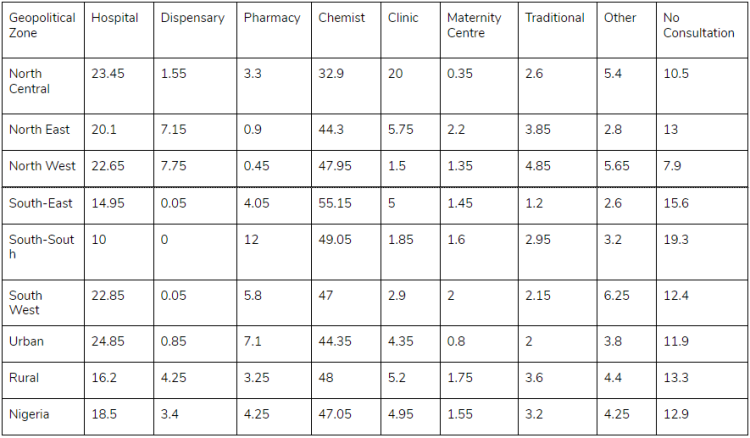It takes a Nigerian an average of 21.3 minutes to receive a health consultation. According to the 2019 General Household Survey, this commute time is even greater in rural communities with a 22.4-minute estimate. Beyond this time lag, a real discrepancy in the healthcare infrastructure of the Giant of Africa lies.
Per the report, residents in southeastern Nigeria spent the most commuting time (27.1 minutes) to access health consultation; closely following was the northeast (25.05 minutes), northwest (21.55 minutes), north-central (19.15 minutes), southwest (17.25 minutes), and south-south (15.45 minutes).
Type of Health Facility Visited
According to the survey, 47.05 per cent of Nigerians visited a chemist for their medical needs. Conversely, only 18.5 per cent used a hospital. Worse, though, as much as 12.9 per cent of Nigerians did not consult with a health facility at all. A further breakdown showed clinic visitations (4.96 per cent), pharmacy checkups (4.25 per cent), dispensary (3.4 per cent), and maternity centre consultations (1.55 per cent). Interestingly, 3.2 per cent of Nigerians visited traditional health care attendants for health needs.
Distribution of Health Facility Visited by Geopolitical Zone
A closer look
They reported most hospital visits in north-central (23.45 per cent), southwestern (22.85 per cent), and northwestern Nigeria (22.65 per cent). And as for south southern Nigeria, it recorded the highest percentage of zero consultations with health facilities. Southeast, southwest, northeast, north-central and northwest followed this rank, in that order.
According to Dr Ifeanyi Nsofor, the CEO of EpiAFRIC and the director of policy and advocacy at Nigeria Health Watch, Abuja, the higher percentages of zero health consultation in the south-south, southeast and southwest are rather strange. However, the health policy expert suggested that self medication and statistical imperfections could have accounted for this. Perhaps, the data did not sufficiently capture other sources of care such as medicine sellers who hawk drugs and are easy to find in the southern parts of the country. In addition, Dr Nsofor noted that religious inclinations could also be a cause of zero consultation with the listed health facilities. Sometimes, people prefer to consult religious homes rather than seek formal or other informal sources of care.
Also, the data revealed the disparity in using health facilities between the rural and urban areas of Nigeria. More Nigerians in urban areas visited health facilities than in rural areas. Per the report, the ratio of urban to rural “zero consultation” was 11.9 to 13.3 per cent. Alternatively, rural areas had higher visits to dispensaries, chemists, clinics, maternity centres, and traditional healthcare centres.
Implications
The general household survey has revealed some gaps in Nigeria’s healthcare delivery. With a national average of 12.9 per cent people living with no form of health consultation, Nigeria still needs to sensitise and enlighten its citizens on the importance of healthcare. Similarly, there is a need to address the fundamental issues that discourage people from receiving care. Some of these issues include health coverage, affordability, and perceptual issues.
More importantly, the survey highlights the imperative to diversify, promote, and strengthen alternative healthcare sources (especially in rural areas). After all, over 68 per cent of Nigerians use alternative health facilities to hospitals; consequently, the smart choice would be to promote these other facilities as alternatives. However, the government should make strides in standardising these alternatives and enforcing compliance with existing standards and best practices. This strategy, in the long run, would prove fruitful as many Nigerians appear to prefer these alternatives such as chemists and pharmacies for their healthcare needs. Similarly, more attention should be placed on traditional healthcare, clinics, maternity centres, and dispensaries.
Within the context of a new-normal
Succinctly, with the advent of a new normal spurred on by the COVID-19 pandemic, this move becomes paramount. In truth, the apprehension to public establishments since the pandemic is not novel. Reportedly, the novel virus brought about a decline in hospital visits across the country. For instance, in May, the Nigerian government reported a 50 per cent drop in the number of outpatient cases. What’s more, antenatal patients reduced by about half the usual number. At the same time, the increased demand for chloroquine and hydroxychloroquine in the country suggests that Nigerians are not opposed to alternative care sources such as chemists or pharmacies. Thus, expanding alternative care options can help allay some public apprehension and ensure that Nigerians are not denied the needed healthcare.
The high travel time to health facilities across the country also reflects the need to provide more health facilities of different hierarchies across the country. This observation tallies with the identified shortage in the distribution of healthcare facilities in the country. And according to a recent DATAPHYTE report, as much as 900,000 units of hospital beds are needed to tackle the existing deficit. More so, there is a need for increased budgetary commitment to healthcare in the country. In this regard, specific healthcare strategies can be targeted to address the healthcare needs in each of Nigeria’s six geopolitical zones.



